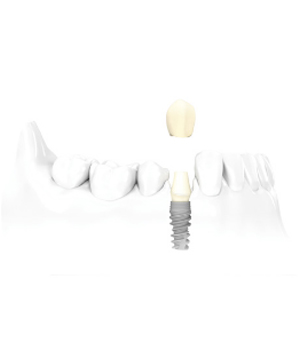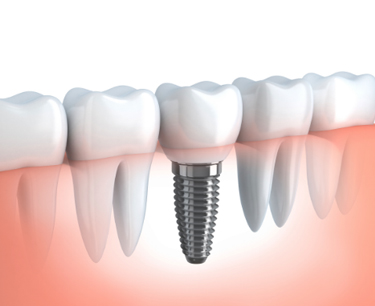Replacing A Single Tooth With A Dental Implant
 A missing tooth can have a negative impact on your quality of life, as well as dental and oral health. When a tooth is missing, healthy teeth tend to shift position towards the gap due to bone loss, affecting how our upper and lower teeth meet.
A missing tooth can have a negative impact on your quality of life, as well as dental and oral health. When a tooth is missing, healthy teeth tend to shift position towards the gap due to bone loss, affecting how our upper and lower teeth meet.
A missing single tooth can be replaced by a dental implant without altering the healthy adjacent teeth. Dr. Sadineni, Implant Dentist at Dublin Metro Dental performs this procedure with minimal discomfort. The implant serves as a replacement for the root of the missing tooth. A small post called an “abutment” is then connected to the implant, and a replacement tooth is cemented on top of the abutment. Your new tooth will look and function just like a natural tooth.
Implant & New Tooth in One Day
 Dr. Sadineni implant dentist proudly offers the very best in cutting-edge technology her office is equipped with 3D CT scan and CEREC technology in treatment planning each case. Most patients receive their implant and crown all in the same day.
Dr. Sadineni implant dentist proudly offers the very best in cutting-edge technology her office is equipped with 3D CT scan and CEREC technology in treatment planning each case. Most patients receive their implant and crown all in the same day.
Implant vs. Tradition Dental Bridge
A dental implant is an excellent way of replacing a single tooth because it does not affect your adjacent teeth. That means no grinding down or crowning of your natural teeth as with bridges, and no metal clasps around your healthy teeth. And because implants are fixed in place, there is no worry about slipping or clicking as with dentures.
Avoiding Bone Loss
A dental implant keeps bone intact and can prevent both bone loss and gum tissue shrinkage, thus protecting surrounding healthy teeth. Bridges and dentures do not provide this type of support and protection. In addition, because a dental implant replaces the root structure, the jawbone is better preserved.
Dental Hygiene
In terms of hygiene, a dental implant is much easier to clean as compared to a bridge. The teeth that support a bridge will often get cavities and can be at risk of failing. Unlike a bridge, an implant cannot be affected by cavities, often lasting a lifetime.




















